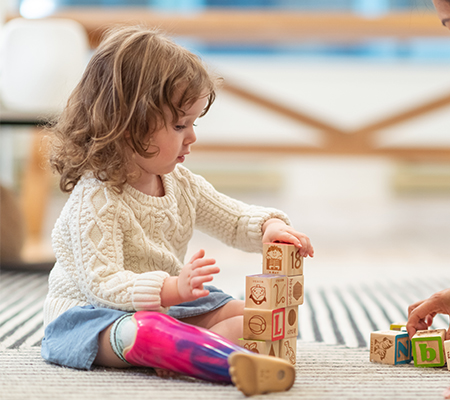
Fine motor skills are things your child can do that require the coordination of several muscles working together. Gross motor skills are much larger movements your child makes with the other parts of their body.
From the moment a baby is born, their brain is drastically changing and learning new things. This process, also known as development, is the foundation to life. Fine and gross motor skills are some of your child’s early developmental milestones.
Fine motor skills are things your child can do that require the coordination of several muscles working together. For example, grabbing some food off a tray or talking. Gross motor skills are much larger movements your child makes with the other parts of their body, such as crawling or walking.
“Every child should expect to hit certain fine and gross motor milestones like grabbing things, talking and walking as they grow up,” said Dr. Keith Pulvermacher, pediatrician with Marshfield Children’s. “As a pediatrician, we are trained to check on those developmental milestones during a well-child checkup to make sure the child doesn’t get too far behind.”
Why developmental milestones are important
Your child’s pediatrician should closely monitor developmental milestones, like those for fine and gross motor skills. If your child is not meeting these milestones, it can help your pediatrician find problems early. The earlier your child’s pediatrician can find the problem, the better the outcome is.
For example, if a child has trouble talking and that continues into kindergarten, it may take longer to fix the issue. Your child also may have trouble with friends and in school because they have a hard time talking.
Fine motor skill example: Talking
Around one year of age, it is average for a child to be able to say mom, dad and a few other words. If they are not able to do this, your child’s pediatrician will try to see if your child can understand words.
“We try to see if they understand everything. If they do, then they possibly just have an expressive problem,” Dr. Pulvermacher said. “If the problem continues to the 15-month check-up, we can recommend speech therapy.”
Gross motor skill example: Walking
At about nine months of age, children are typically pulling themselves up next to a chair and holding on. At one year, they are typically walking. If a child is having trouble with walking, it is a sign that more evaluation is needed.
“If a child has trouble putting their foot down flat, that can be a sign of a tight Achilles tendon,” Dr. Pulvermacher said. “In that case, the earlier the child gets into therapy to stretch that Achilles tendon out, the better it is down the road.”
When do fine and gross motor skills begin and end?
Fine and gross motor skills can become apparent in babies as early as two months of age. These milestones can include smiling when people talk to the baby or starting to make noises. Next, your child will start to roll over and grab things. Motor skills are nearly done developing when your child is in the early to middle adolescent stage.
“Teens are still a little clumsy and sometimes things like stuttering can happen into adulthood, but we eventually find ways to cope with all of these common developmental issues,” Dr. Pulvermacher said. “Coordination is an important skill that develops throughout life.”
Common barriers to proper development
Lack of attention is a common barrier to proper development. Children that are left in their playpens with little interaction at a young age are typically behind in both fine and gross motor development.
The other common barrier are children with different genetic conditions that cause developmental delays. Removing these concerns from the list is another reason why pediatricians look at developmental milestones.
In most cases, Dr. Pulvermacher says that parents have been trying everything to improve their child’s fine and gross motor skills. When that child doesn’t meet the parent’s expectations that can be discouraging.
“I always remind parents that these developmental milestones are averages, not absolutes,” Dr. Pulvermacher said. “In most cases, there are things we can do to help kids that are behind.”
To learn more about developmental milestones and how to apply them to your child, talk to your child’s pediatrician.
For questions regarding child development, talk to a Marshfield Children’s provider.
Schedule appointment Message your provider
Related Shine365 articles
Does my child need a pediatric eye exam?
Child development screenings: What parents need to know
Social emotional health: Parenting kids to thrive as adults
3 top apps for your child’s mental, physical and developmental health

